Economy
Will magic of pay, charm stop vanishing act?
Updated: 2011-01-26 11:19
By Gao Changxin and Yu Ran (China Daily)
Empty seats at the once bustling job market in Datang township, Zhuji, Zhejiang province, bear testimony to a labor shortage in this file photo taken in December. [Photo / China Daily]
Working conditions and wages improve as firms in coastal regions attempt to stave off post-festival labor shortage.
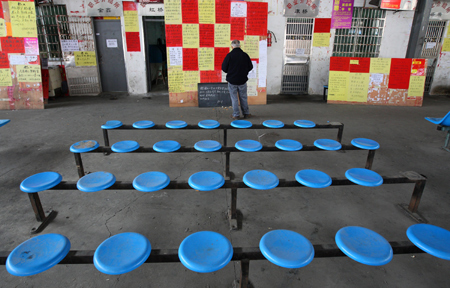
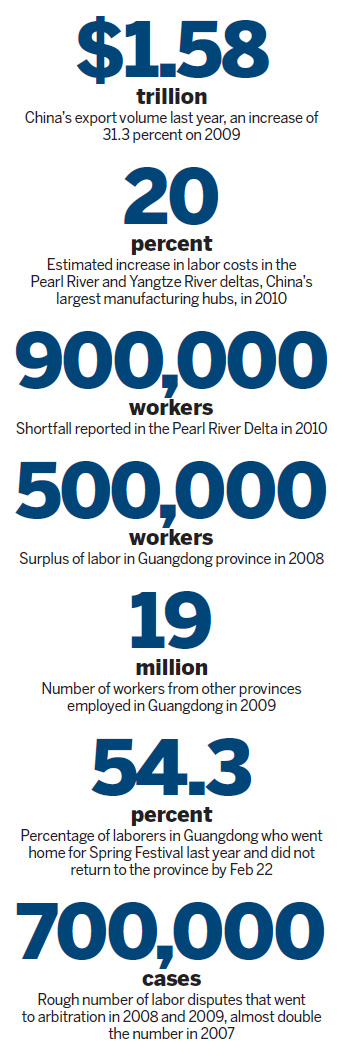
Gao Changxin and Yu Ran report from Shanghai.
When workers at Orans Co Ltd returned to work at the start of the new year, they were greeted with a welcome usually reserved for visiting officials and executives.
The sanitary ware company's entire management team, including chairman Lin Huayou, lined up outside its factory in Taizhou, Zhejiang province, and bowed to staff as they arrived. Workers with parents aged over 70 were also given bonuses of 200 yuan ($30).
Introduced as part of Orans' new ethos of "loyalty before interest", such displays of respect toward laborers are seldom seen in China, where the migrant workforce is effectively at the bottom of the pile.
Factory workers receive just 1,000 to 1,500 yuan per month to toil on production lines for at least 60 hours a week, while government agencies tend to look the other way when workers' rights are infringed, according to a 2010 report by Hunan province's bureau of commerce.
However, with industries facing a repeat of the massive labor shortage that hit after last year's Spring Festival holidays, bosses are being forced to do more to keep up staffing levels.
Last February, for the first time in decades, many manufacturers in the eastern coastal regions, the powerhouse of China's economic growth, struggled to find enough cheap labor to maintain production.
Among the worst affected were those in export industries. Even when orders began to flow in again as markets recovered from the global financial crisis, operational capacities were extremely limited. As a result, factories nationwide significantly raised their salaries to attract more hands.
National Bureau of Statistics data shows that China's export volume hit $1.58 trillion in 2010, an increase of 31.3 percent on 2009. At the same time, labor costs in the largest manufacturing hubs - the Pearl River and Yangtze River deltas - rose 20 to 25 percent, Jing Ulrich, head of China equities and commodities at JPMorgan, recently told the Financial Times.
The pay hikes achieved only limited success. A study published in late 2010 by Guangdong province's bureau of human resources and social security set the Pearl River Delta's labor shortage at more than 900,000. Yet, two years ago, when the financial crisis broke, the province had a surplus of 500,000 laborers, according to official statistics.
Major cities in the Pearl River Delta - Guangzhou, Shenzhen and Dongguan - have a combined shortfall of about 550,000 workers, the human resources bureau survey found.
Rising salaries
Millions of migrant workers travel home to the countryside for the annual lunar new year holiday (this year from Feb 2 to 8) and, every year, more choose to stay there instead of returning to work in the cities.
Guangdong, the most popular destination for the rural workforce, employed roughly 19 million people from other provinces in 2009. However, last year almost 55 percent of its laborers who went home did not return by Feb 22, nine days after the end of the festivities, according to figures from the province's human resources bureau.
"In the current climate, employers seem worried that more people are likely to stay home and are bracing for the worst," said Feng Jin, a professor of labor economics at Fudan University.
|
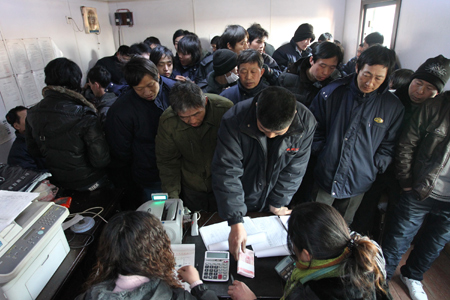 |
|
Workers wait to collect their salaries on Jan 24 at a shipping company in the city of Qinhuangdao, Hebei province. Those who return after Spring Festival will receive bonuses. [Photo / Xinhua] |
In Zhejiang, for example, Wenzhou Gold Emperor Shoes increased its workers' monthly salaries by 20 percent last year and is planning to raise them another 10 percent to about 2,300 yuan. Its salary in 2009 was 1,600 yuan. (The province's minimum wage is 1,100 yuan.)
"We lost about 1,000 workers last year and, based on our experience, many are unlikely to come back this year after the holiday," said Zheng Shili, deputy general manager of the company, which employs 8,000 workers. "We can't afford to lose any more because we're planning on expanding production."
Executives from Gold Emperor Shoes will also attend job fairs in different provinces to broaden recruitment opportunities, he added.
Juyi Group Shoes, also based in Wenzhou, is encouraging its workers to introduce friends and relatives, offering a 200-yuan finder's fee for every successfully hire. "We're really worried about what's going to happen to the labor market," admitted general manager Pan Jianzhong. "Introduction is a more effective way to find workers who are likely to stay longer. People who work with friends and relatives are happier and less likely to leave."
Salaries on offer at Andemen, one of the largest labor markets in Nanjing, capital of Jiangsu province, rose by an average of 50 percent in 2010. Yuan Liang, director of its executive office, said he predicts further hikes. "Migrant workers don't hunt for employers anymore, employers hunt for them," said Yuan, whose labor market helped fill 60,000 jobs last year.
Underlying problems
|
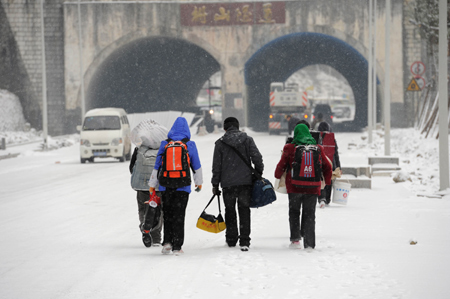 |
|
A group of migrant workers make their way home for the lunar new year holidays through the winter snow in Southwest China's Chongqing municipality on Jan 19. [Photo / Xinhua] |
As of last September, there was a surplus of more than 100 million laborers in rural areas, according to China's Human Resources, a white paper released by the Information Office of the State Council.
"Favorable government policies toward farming in recent years have made farmers richer," said Feng. "Some (workers) might choose to stay at home if salaries in the cities are not that much higher."
In 2006, the central government scrapped the country's agricultural tax, which had been levied for almost 2,600 years. Estimates suggest that exemption from agricultural tax will save farmers a combined 50 billion yuan a year.
At the same time, increased agricultural investment and allowances were introduced to encourage people to grow crops, while protective prices were set on grains so that farmers would not be hit by falling prices. The government's purchase price for white wheat also rose to 1.9 yuan a kilogram from 1.44 yuan a kg in 2006. Authorities even offer consultancy services to boost the use of advanced technologies and productivity.
"The labor shortage in coastal regions, such as the Pearl River and Yangtze River deltas, is also attributable to the growth of second-tier inland cities like Chongqing and Wuhan (capital of Hubei province)," said Du Yang, director of the Chinese Academy of Social Sciences' labor and human capital research center. "Salaries have grown rapidly in these places along with economic development, and many migrant workers prefer to go there because it's simply closer to home."
|
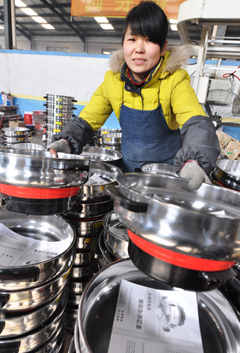 |
|
A worker stacks pans at an electronic cooker factory in her hometown in Shandong province. Many people are now finding jobs close to their families and friends. [Photo / China Daily] |
Another reason for the labor shortage, say experts, is that younger generations of workers view the world differently from their parents.
"Young people were raised in much better environments than their parents and are under much less pressure to support their families," said Feng at Fudan University. "They are generally more educated and thus more aware of their legal rights. They also have more open minds and, to some extent, want to live like their city peers."
Young migrant workers showed their discontent over low wages and infringements last year with a series of strikes to demand better working conditions, including one at a Honda parts factory in Foshan, Guangdong.
As well as demonstrations, the number of labor disputes going to arbitration or courts also rose sharply. In 2008 and 2009, when factories were closing due to the financial crisis, roughly 700,000 labor disputes went to arbitration, almost double the number in 2007, according to the Ministry of Human Resources and Social Security.
"The era of cheap labor and materials, which has underpinned China's rapid economic development for 30 years, is over," said Du at the Chinese Academy of Social Sciences. "Companies should prepare for higher salaries or face a labor shortage."
Shen Gaoming, chief economist at Citigroup Global Markets Asia, said that, although China's labor supply will not peak until 2015, daily working hours have been steadily shrinking due to higher incomes.
"When a country's GDP per capita reaches $3,000 to $4,000, workers have more than enough money to subsist and want more leisure and entertainment time, making them reluctant to work overtime," he said. "That effectively reduces the supply of cheap labor and tends to push up workers' wages in the long term."
Feng at Fudan University expects migrant workers' salaries to rise in tune with the country's GDP growth rate over the next five years, with welfare and working conditions improved accordingly. "Incomes are on an upward track, as supported by the draft of the 12th Five-Year Plan (2011-2015), which significantly highlights the need to boost domestic consumption," he said.
From a long-term perspective, increased labor cost is a positive thing, said Du, "as it forces Chinese enterprises to transform from labor-intensive to technology- and capital-intensive or face losing competitiveness".
"It's a turning point for Chinese industries and is a phase developed nations like Japan have all gone through," he added. "A transition has to be made to make the growth models of Chinese companies and the overall economy more sustainable. There will be pains during the transition but it is the right way to go."
Like dozens of other migrant workers at Fuzhou Railway Station in Fujian province on Jan 10, Zhang Xiao sat on a pile of bulging bags waiting for a train to take him home. He was chatting excitedly with a friend about his plans for Spring Festival.
"My boss wanted me to stay longer and even offered me a higher wage, but I turned it down," said the 27-year-old chef from Chengdu, capital of Sichuan province. "I just can't wait to see my son.
"I may not come back after the holiday, as I'm thinking about opening my own restaurant in my hometown. I may earn slightly less than working in the city at first, but the living cost is far less," he added.
Wei Tian in Fuzhou contributed to this story.
E-paper

Ear We Go
China and the world set to embrace the merciful, peaceful year of rabbit
Preview of the coming issue
Carrefour finds the going tough in China
Maid to Order
Specials

Mysteries written in blood
Historical records and Caucasian features of locals suggest link with Roman Empire.

Winning Charm
Coastal Yantai banks on little things that matter to grow

New rules to hit property market
The State Council launched a new round of measures to rein in property prices.




